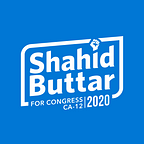Algorithms for profit throw truth and democracy out the window
On October 19, the U.S. Department of Justice, along with the Attorneys General of 11 states, filed a lawsuit against Google. It is the most significant antitrust case against a tech company since the historic lawsuit against Microsoft 20 years ago — but it remains the tip of an iceberg that Congress has generally failed to heed.
I have long been concerned about tech monopolies, and how they have undermined not only competition, but also their users and the Internet as a whole. That’s one reason I worked at the Electronic Frontier Foundation, the world’s most prolific non-profit battling for digital rights.
Twenty years ago, I studied antitrust law at Stanford, and was invited by the Department of Justice to work at the Antitrust Division the summer after my first year of law school. I ultimately made other choices driven by the Bush administration’s resignation of antitrust enforcement, but I’ve remained committed to restoring antitrust law as an intermediate step towards establishing human rights to basic needs.
My recognition of how to leverage longstanding roots in the law to cultivate new rights is among the reasons why I’m running for Congress.
The new DOJ lawsuit against Google is a good start. It represents the long overdue application of well-settled legal principles, such as the prohibition on companies leveraging their dominance in one market to artificially their products or services in another market. DOJ observes that Google’s dominance of the search market was extended and entrenched through agreements with device manufacturers that undermined opportunities for other products to compete fairly.
Beyond enforcing existing antitrust laws, we need to write some new ones
One of the most important things Congress could do when legislating new antitrust laws is to statutorily enshrine — and expand — the essential facilities doctrine. It was cited to break up AT&T, and also to require railroad companies to share access to bridges crossing major rivers. It recognizes affirmative obligations on companies whose control over essential infrastructure could easily constrain competition. While judicially created to constrain monopolies, the doctrine has fallen out of favor as the right-wing took over our courts.
One shape that the essential facilities doctrine could take if statutorily enshrined and forced into the courts would be to mandate interoperability: requiring companies to allow users of their platforms to not only download their data, but also to receive it in formats that would allow them to easily migrate to competing platforms. Such a requirement would radically empower Internet users while putting big tech firms in their place.
Another key principle in strengthening antitrust enforcement of tech companies is recognizing — in the legal code since courts have declined to acknowledge — that harms to consumers can include eroding privacy protections or service standards, not just price inflation.
At the moment, federal regulators are effectively blinded to harms to competition and consumers stemming from nominally “free” services. How can a consumer be harmed if a product is free? Companies in the online advertising industry (including every major social media platform) treat users not as consumers, but as products — but the law currently doesn’t not recognize that.
This is an easy fix that no one in Congress seems to understand — perhaps because many Members of Congress, including the Speaker of the House, were first elected before the Internet was developed, know little about regulating it, and don’t shown up for public debates to prove their competence.
Legislating the recognition that harms to competition can inhere in the erosion of privacy, in particular, would represent a mandate for federal regulators to pursue antitrust remedies against companies like Facebook, who have repeatedly — and arbitrarily — changed their terms of service.
Recognizing harms to consumers in eroding service standards could also help provide an additional legal bulwark to protect net neutrality from Internet Service Providers wielding local monopolies.
Another way tech companies have abused users — and the Internet — is by acquiring their competitors to prevent competition. But regulators allow too many problematic mergers.
Legislation to require regulators to apply more exacting scrutiny, and to allow some manner of public participation in potential settlements, is long overdue.
These are common sense measures demanded by the public. But until we change the occupants of a few seats in Congress, we can rest assured that tech companies will continue to run circles around regulators, the Internet, and the public.
You can help our campaign to bring real experience to Congress
Donate to power our voter contact and volunteer turnout efforts.
Volunteer to call, text, and reach out to people in the San Francisco area.
